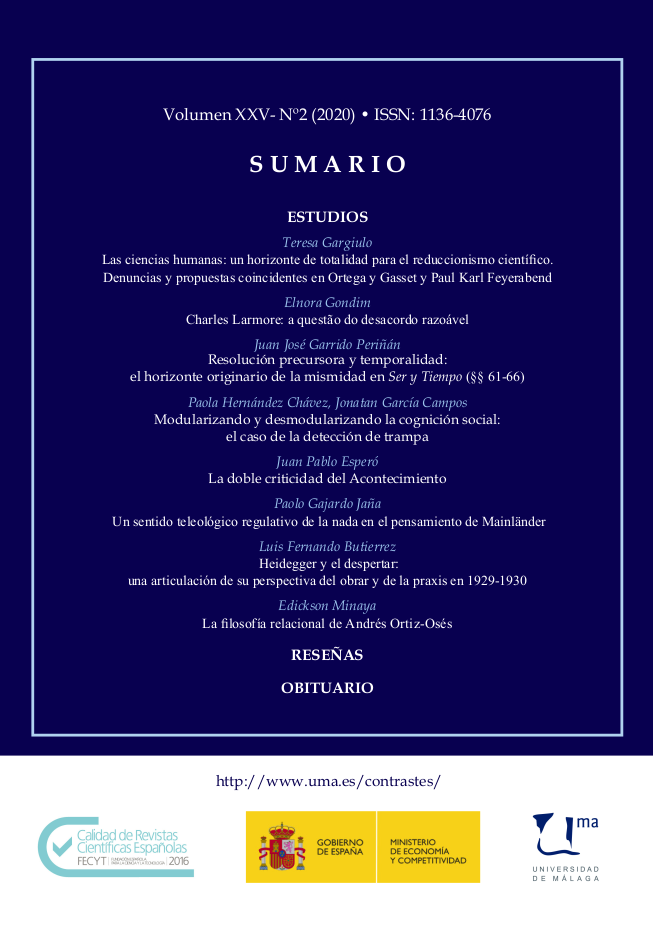The Relational Philosophy of Andrés Ortiz-Osés
DOI:
https://doi.org/10.24310/Contrastescontrastes.v25i2.7744Keywords:
SYMBOLIC HERMENEUTICS, RELATIONAL PHILOSOPHY, IMPLICATIONISM, SENSE, SYMBOLAbstract
The hermeneutical thinking of the Aragonese philosopher Andrés Ortiz-Osés is interpreted as a relational philosophy. Philosophy that highlights the mediating nature of reality, as a construction of meaning thanks to language and interhuman experience. It also includes the characteristics of this ontological reflection, very attached to the consequences of the crisis of traditional metaphys- ics and the impulse of hermeneutical philosophy. In view of this, ortizosesiano thought tries to overcome inherited dualisms and monism’s, to put the relationship between human being, world and language. The objective: a third ontological pathway called implicationism or relationships.Downloads
Metrics
Publication Facts
Reviewer profiles N/A
Author statements
Indexed in
-
—
- Academic society
- N/A
- Publisher
- Universidad de Málaga
References
CAMINERO, J. 1984: «El idiolecto discursivo-estilístico en la obra del pensador A. Ortiz-Osés», en Letras de Deusto, Vol. 14, No.28, pp.129-158.
GARAGALZA, L. 2009: «Prólogo: Filosofía del sentido», en Ortiz-Osés, A. Heide-gger y el ser-sentido. Edición de Luís Garagalza y Javier Martínez Contre-ras. Bilbao: Universidad de Deusto, Pp.7-10.
GARAGALZA, L. 2011: «Presentación: Sensus –la clave del sentido», en Filosofía, hermenéutica y cultura. Ensayos en honor de Andrés Ortiz-Osés. Deusto: Bilbao, pp.13-16.
GARAGALZA, L. 2014: El sentido de la hermenéutica. La articulación simbólica del mundo. México: Anthropos.
GUERENABARRENA, F. 2008: «Epílogo: la hermenéutica simbólica de Andrés Ortiz Osés», en Ortiz-Osés, A. Meditación del existir. Una revisión del mundo. Zaragoza: Olimar, pp.307-316.
HERRERO GIL, M. 2011: «Teorías del imaginario: entre la ciencia y la mística»en Garagalza, L. (Coord.), Filosofía, hermenéutica y cultura. Ensayos en honor de Andrés Ortiz-Osés. Deusto: Bilbao, pp.37-56. IBON, Z. 2011: «Obertura: filosofía aforística», en Garagalza, L. (Coord.), Filosofía, hermenéutica y cultura. Ensayos en honor de Andrés Ortiz-Osés. Deusto: Bilbao, pp.17-20.
LANCEROS, P. 1993: «Presentación: la metafísica ineludible», en Ortiz-Osés, A. Las claves simbólicas de nuestra cultura. Matriarcalismo, patriarcalismo y fratriarcalismo. Barcelona: Anthropos, pp.11-12.
LANCEROS, P. 2011: «Los libros, los años (Itinerarium mentis ad sensum)», en Ga-ragalza, L. (Coord.). Filosofía, hermenéutica y cultura. Ensayos en honor de Andrés Ortiz-Osés. Deusto: Bilbao pp. 239-254.
SOLARES, B. 2002: El Dios andrógino. La hermenéutica simbólica de Andrés Ortiz- Osés. México: Porrúa. Suplemento Anthropos dedicado a Andrés Ortiz-Osés. 1986, No.57, Barcelona: Anthropos.ORTIZ-OSÉS, A. 1973: Antropología hermenéutica. Para una filosofía del lenguaje del hombre actual. Madrid: Ricardo Aguilera.
ORTIZ-OSÉS, A. 1976: Mundo, hombre y lenguaje crítico. Estudios de filosofía hermenéutica. Salamanca: Sígueme.
ORTIZ-OSÉS, A. 1977: Comunicación y experiencia interhumana. Una hermenéutica interdisciplinar para las Ciencias Humanas. Bilbao: Desclée de Brower.
ORTIZ-OSÉS, A. 1982: El inconsciente colectivo vasco. Mitología cultural y arquetipos psicosociales. Deusto: Txertoa. ORTIZ-OSÉS, A. 1985: Antropologíasimbólica vasca. Barcelona: Anthropos.
ORTIZ-OSÉS, A. 1986: La nueva filosofía hermenéutica. Hacia una razón axiológica posmoderna. Barcelona: Anthropos.ORTIZ-OSÉS, A. 1988: El matriarcalismo vasco. Bilbao: Universidad de Deusto. ORTIZ-OSÉS, A. 1989: Metafísica del sentido. Bilbao: Universidad de Deusto.
ORTIZ-OSÉS, A. 1993: Las claves simbólicas de nuestra cultura: matriarcalismo, patriarcalismo, fratriarcalismo. Barcelona: Anthropos.
ORTIZ-OSÉS, A. 1995: Visiones del mundo. Interpretaciones del sentido. Bilbao: Universidad de Deusto.
ORTIZ-OSÉS, A. 1996: La diosa madre. Interpretación desde la mitología vasca. Madrid: Trotta.
ORTIZ-OSÉS, A. 1999: Cuestiones fronterizas. Una filosofía simbólica. Barcelona: Anthropos.
ORTIZ-OSÉS, A. 2000: La razón afectiva. Arte, religión y cultura. Salamanca: Editorial San Esteban.
ORTIZ-OSÉS, A. 2003a: Amor y sentido. Una hermenéutica simbólica. Barcelona: Anthropos.
ORTIZ-OSÉS, A. 2003b: Co-Razón. El sentido simbólico. Madrid: Kalamos Libros.
ORTIZ-OSÉS, A. 2007: Los mitos vascos. Aproximación hermenéutica. Bilbao: Universidad Deusto.
ORTIZ-OSÉS, A. 2008: La herida romántica. Salir del almario. Barcelona: Anthropos.ORTIZ-OSÉS, A. 2014: El Dios heterodoxo. Los demonios de nuestra cultura. Zaragoza: Institución «Fernando el católico».
ORTIZ-OSÉS, A. y LANCEROS, P. (Coords.) 1997: Diccionario de Hermenéutica. Bilbao: Universidad Deusto.
Downloads
Published
How to Cite
Issue
Section
License
This journal provides immediate free access to its content under the principle of making research freely available to the public. All content published in Contrastes. Revista Internacional de Filosofía, are subject to the Creative Commons Attribution-NonCommercial-ShareAlike 4.0 license whose full text can be found at <http://creativecommons.org/licenses/by-nc-sa/4.0>
It is the responsibility of the authors to obtain the necessary permissions of the images that are subject to copyright.
Authors whose contributions are accepted for publication in this journal will retain the non-exclusive right to use their contributions for academic, research and educational purposes, including self-archiving or repository in open access repositories of any kind.
The electronic edition of this magazine is edited by the Editorial Service of the University of Malaga (Uma Editorial), being necessary to cite the origin in any partial or total reproduction.










5.png)
